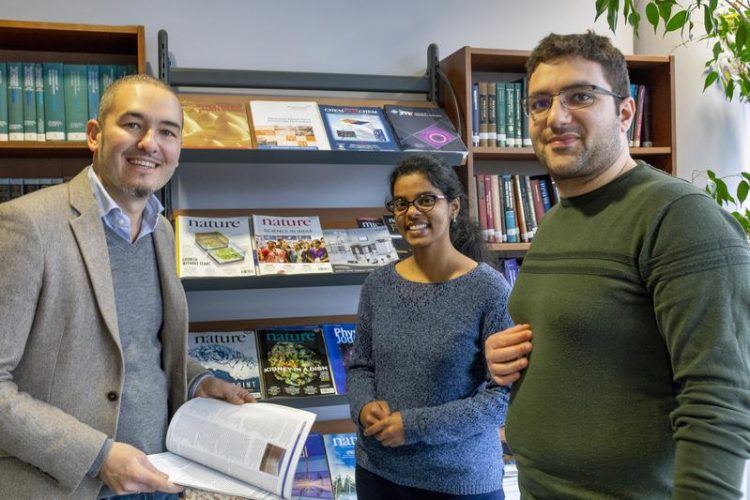9.1 million euros for trinational quantum research

Prof. Dr. Guido Pupillo (left), scientific director of QUSTEC, talking to doctoral students. Photo: Catherine Schröder / Université de Strasbourg
The project “Quantum Science and Technologies at the European Campus” (QUSTEC) has been selected by the European Commission as a joint international and interdisciplinary doctoral program in quantum sciences and technologies. Led by Eucor – The European Campus, it will bring together the Universities of Basel, Freiburg and Strasbourg, Karlsruhe Institute of Technology and IBM Research Zurich.
Together, they provide 39 doctoral candidates a training experience in this key emerging area. The program is funded for a five-year period with a total amount of 9.1 million euros.
In addition to 4.2 million euros from the European Union, there is co-financing from the participating partner organisations as well as from Santander through its own Santander Universities division, the world’s largest private sponsor of higher education, according to a UNESCO study. The QUSTEC project has been launched with the support of the Franco-German University.
QUSTEC aims to address some of the grand challenges in Quantum Science today: The principles of quantum mechanics, which govern physics, chemistry, material science and computing at the atomic scale have already led to a wave of new technologies.
In new applications, quantum technologies provide a massive leap that can be a decisive factor for many European industries and markets in the 21st century. The program QUSTEC contributes to this through a highly international structured four-years doctoral training program and research initiative that traverses all main domains of Quantum Science.
The young researchers can choose between the participating locations and collaborate with industrial partners from the Upper Rhine and surrounding regions. The project strengthens the focus of Eucor – The European Campus in its strategic priority area “Quantum Science and Technologies.”
“Quantum science is an interdisciplinary field that can lead to new technologies precisely because of the multitude of perspectives”, says Prof. Dr. Guido Pupillo of the University of Strasbourg, scientific director of the program.
“We would like to bring young researchers from all over the world to the Upper Rhine in order to perform fundamental research and to work on applications, such as new, secure communication networks, more precise sensors, the development of new quantum materials and prototype quantum computers.”
QUSTEC is co-financed by the Horizon 2020 Marie Skłodowska-Curie “COFUND” program. This is the first time that a project submitted by the European Grouping of Territorial Cooperation (EGTC) Eucor – The European Campus has been approved by the European Commission under the Horizon 2020 research program. In 2015, the five universities in the Upper Rhine region founded the first EGTC, which is supported solely by universities.
“The approval confirms our strategy and our concept. The universities of the European Campus are strong, where they complement each other in terms of content, and where they can act more strongly together on an European and global level,” says Prof. Dr. Hans-Jochen Schiewer, President of Eucor – The European Campus and rector at the University of Freiburg. “I am very pleased about the success of the scientists involved, which simultaneously proves that we can open up new opportunities for cross-border research activities through our common legal personality.”
Prof. Dr. Tobias Schätz
Physikalisches Institut
Albert-Ludwigs-Universität Freiburg
Phone: +49 (0)761 / 203 – 5815
tobias.schaetz@physik.uni-freiburg.de
https://www.pr.uni-freiburg.de/pm-en/press-releases-2019/9-1-million-euros-for-t…
Media Contact
All latest news from the category: Awards Funding
Newest articles

High-energy-density aqueous battery based on halogen multi-electron transfer
Traditional non-aqueous lithium-ion batteries have a high energy density, but their safety is compromised due to the flammable organic electrolytes they utilize. Aqueous batteries use water as the solvent for…

First-ever combined heart pump and pig kidney transplant
…gives new hope to patient with terminal illness. Surgeons at NYU Langone Health performed the first-ever combined mechanical heart pump and gene-edited pig kidney transplant surgery in a 54-year-old woman…

Biophysics: Testing how well biomarkers work
LMU researchers have developed a method to determine how reliably target proteins can be labeled using super-resolution fluorescence microscopy. Modern microscopy techniques make it possible to examine the inner workings…





















